Quiz games. They’re one of the most basic forms of game out there, going a long, long way back to the days of game shows on radio and television, persisting to this very day. They’ve also been a part of videogaming from the early days: as soon as ROM chips could feasibly hold a decent amount of text, quiz games started to appear in arcades and on consoles.
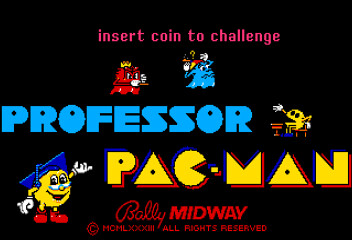
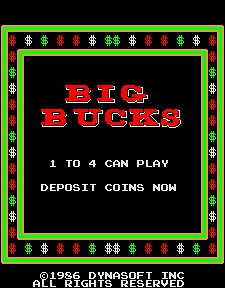
Nowadays, when you think of arcade quiz games, you probably think of something like the multiplayer setups you see at trivia nights in a local bar. This is the direction Western quiz games evolved in: they never really eschewed a game-show/board-game style format, and evolved to implement either real-money gambling mechanics or large-scale multiplayer, competitive functionality.
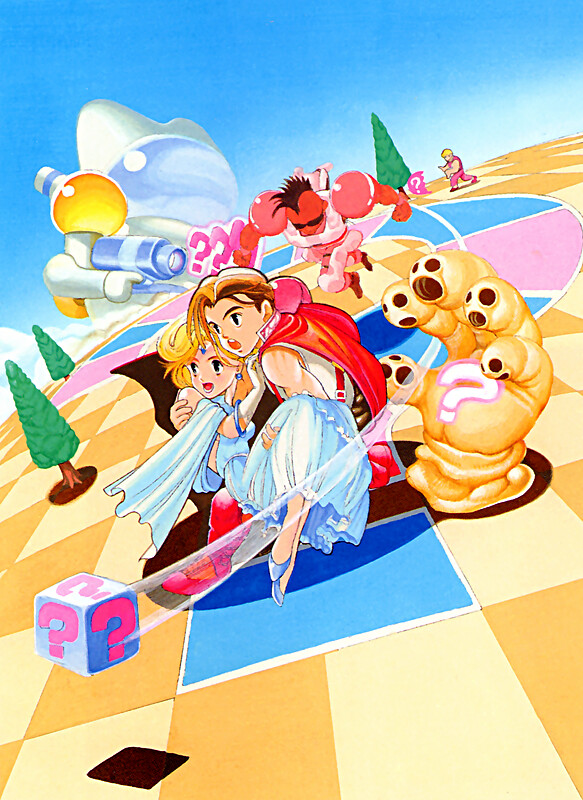
In Japan, however, things played out very differently. Arcade quiz games started to appear there in the mid-late 80s, through companies like Sega and Nichibutsu. As the 90s came along, a renaissance of quiz-game development created a unique, fascinating genre with an abundance of different thematic elements.
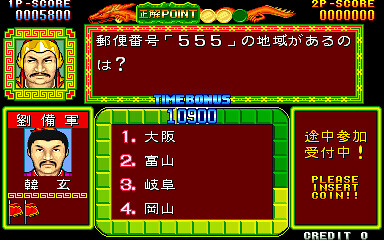
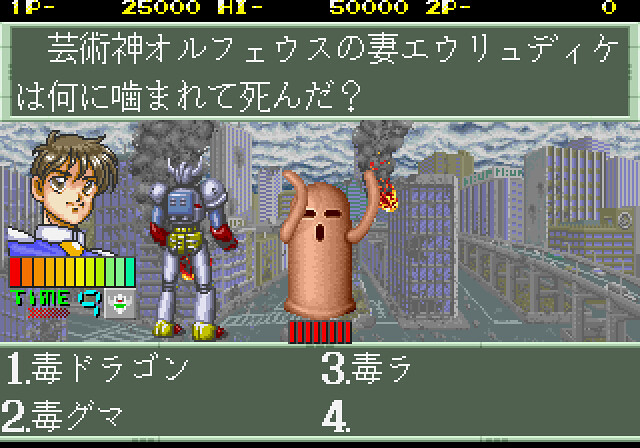
The genre first saw significant advancement through games like Adventure Quiz: Capcom World, a trivia game loaded with 80s Capcom fanservice, and Mitchell’s Quiz Sangokushi, which melded the question-and-answer format with strategic, territory-conquering gameplay. These games utilized elements of visual novels and strategy games to make the quiz experience more appealing and engaging. Other games put quiz elements into fun new genres: Taito’s Quiz Chikyuu Boueigun (“Quiz Earth Defense Force,” no relation to the current Earth Defense Force games by D3 Publisher) has you saving the planet in a story that’s chock-full of classic sci-fi parodies, while SNK’s Quiz Daisousasen (“Quiz Big Criminal Investigation”) is a detective story that morphs into a weird sci-fi/horror thing at the end. You still had game-show style quiz games too, but they were quickly losing ground to more ambitious efforts.
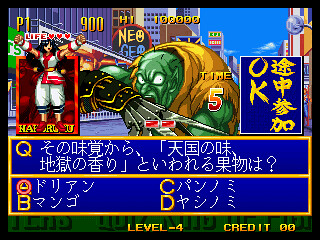
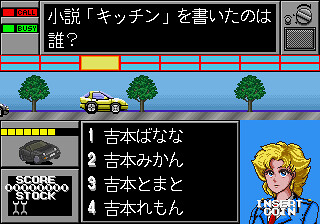
In some cases, publishers adapted existing properties but added a quiz-game twist, hoping the familiar name would draw in customers. This is how we got games like Saurus’s Quiz King of Fighters and Taito’s Quiz HQ, which combined existing game properties with a quiz-game element. As time passed, however, more and more experimentation happened. The mid-late 90s were really a golden age for arcade quiz games, resulting in a stunning variety of thematic and gameplay genres mixing in with traditional quiz elements.
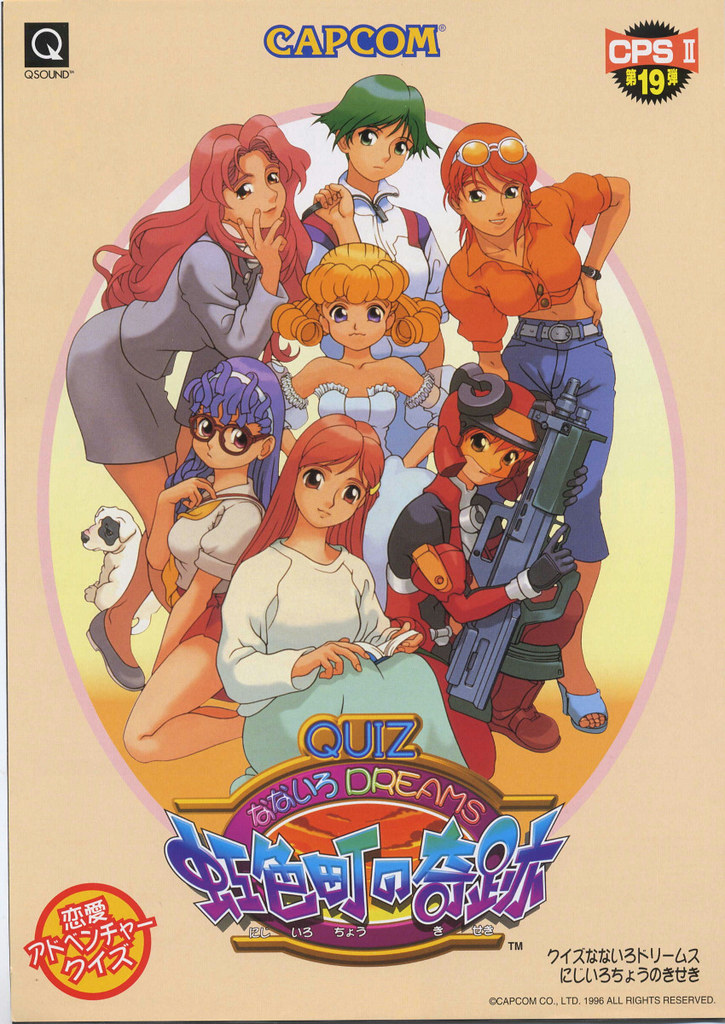
Interestingly, quiz games tend to be very lengthy, sometimes taking an hour or more to complete from start to finish… which, in theory, goes against the short, focused play experiences arcades want to offer. You want to get people off that machine as quickly as possible, right? However, with these new thematic ideas, players became more committed to seeing the games through to the end. It doesn’t hurt as much to abandon a gameshow you feel like you’re not doing well in, but when you’re in the middle of a story about saving the universe? Hell yes you’re going to brute-force your way through with yen! Add a second player into the mix and watch earnings double!
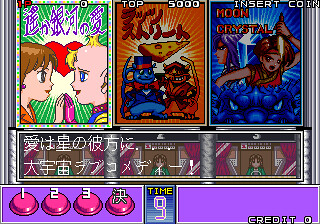
Unfortunately, most the appeal of these games is lost on the West. Japanese quiz games might be the most culturally impenetrable games out there: not only do you have to be fluent in the language, you also have to be fluent in a variety of cultural elements. Sure, you might know the multiple readings of thousands and thousands of kanji, but unless you lived in Japan during the early 1990s and remember which popular talent of the time appeared in a specific ad campaign, you’re probably not going to get very far. That is, unless you cheat. Thankfully, emulating most of these games allows you to cheat through the quiz portions, making the games somewhat more accessible… though it does result in the game losing a big part of its inherent charm. (Plus, even if you do cheat, if you don’t speak the language you can find yourself making very poor choices.)
You don’t hear a lot about quiz games nowadays — the genre saw a sharp decline in development and interest after the 1990s. Currently, the big name (and basically the only name) in Japanese quiz games is Konami’s Harry Potter-inspired Quiz Magic Academy, which has a new arcade version releasing soon (along with a mobile version that is no doubt raking in plenty of money). Right now, it’s practically the only arcade quiz game in town, unless your local game center has an older game installed in a cabinet somewhere.
But where does someone who doesn’t know anything about Japanese arcade quiz games go to get a good sampling of what the genre has to offer? Well, that’s why I’ve taken the time to write this. Today, we’re going to take a look at some noteworthy Japanese-style arcade quiz games: One that, against all odds, got a localized release, and three others that showcase some very interesting experiences.
Quiz & Dragons (Capcom)
If you know of any Japanese-style arcade quiz game, it’s probably Quiz & Dragons… simply because it’s the only such game to get an English release. You have to hand it to Capcom: they tried their best to make this game palatable to Western audiences. The problem is… well, as far as quiz games go, this simply isn’t very good.
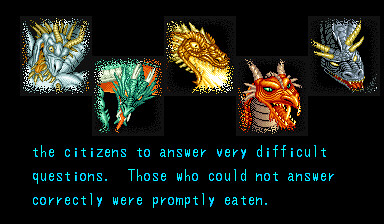
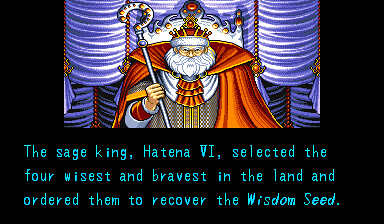
As the title suggests, the theming of Quiz & Dragons is fantasy-based. The story here is that a bunch of monsters invaded a fantasy realm and used the populace’s lack of trivia experience to have an excuse to eat them all. As a brave warrior from one of four classes, you set forth to destroy the invasion of foul beasts by killing them… with knowledge!
(Sidenote: You’ll see the word Hatena a lot in regards to quiz games. That’s because the Japanese word for question mark.)
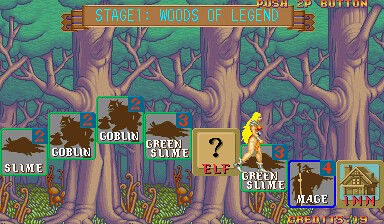
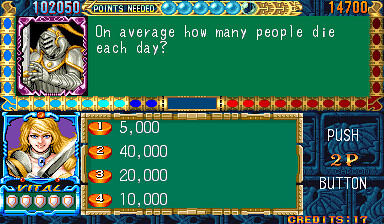

It’s clear that Capcom expected the novelty of the game to draw in audiences: A fantasy trivia game? Well, that’s certainly something we’ve never seen before in North America! Remember, too, that this was around the time Magic Sword and King of Dragons were doing well in arcades, so they were clearly hoping to piggyback off their success. How did it do? Well… this is about the only game of its sort to see an English release. Capcom made several other quiz games after this, none of which were localized. I think that basically says it all.
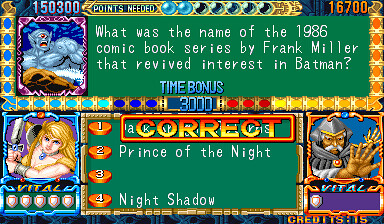
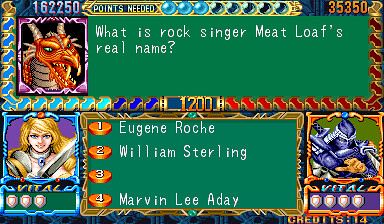
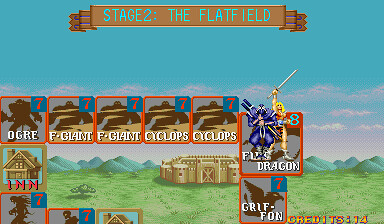
It certainly didn’t fail for lack of trying. The game is very well localized, with all-new questions expressly tailored to a North American audience. There’s some good variety in the questions overall (even though it seems like the game dwells a lot on baseball and 80s TV shows) and the English text reads fine. The problem here is that Quiz & Dragons is really dull.
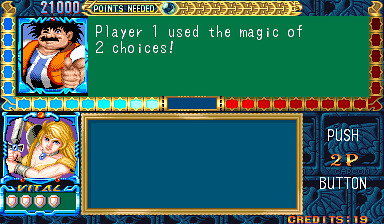
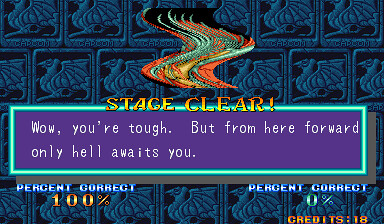
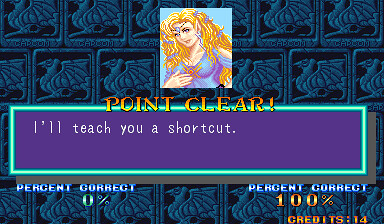
Other Japanese-style quiz games reward you for doing well with fun things: cutscenes, dialogue, bonuses, and entertaining animations. Quiz & Dragons offers almost none of these: Your characters’ animations are minimal, Enemies don’t react when you answer correctly (and simply swirl away when defeated), and bonus areas with items and life rewards are few and far between (and require luck to access). Each of the four classes has a beneficial skill that can randomly trigger, but it’s pretty clear that the Amazon’s skill (randomly eliminating up to 2 incorrect answers) is the best of the bunch. You also can’t choose when these skills get used, meaning to you spend a good chunk of the game crossing your fingers. The novelty’s all but worn off by the end of the first area: by area 2, enemies have a whole mess of health and take forever to kill, making the game quickly feel like a total slog. It’s not hard to see why this didn’t start a revolution of localized quiz games.
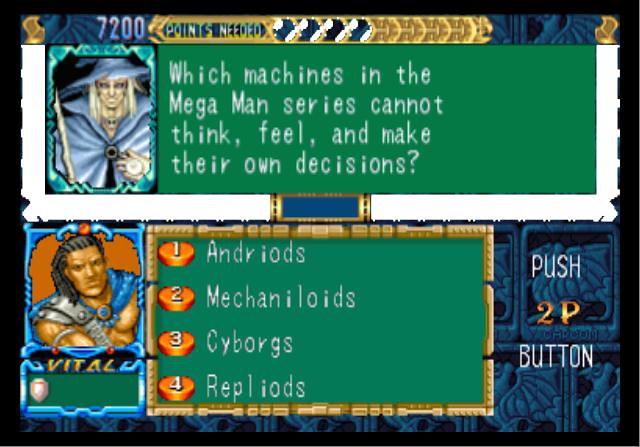
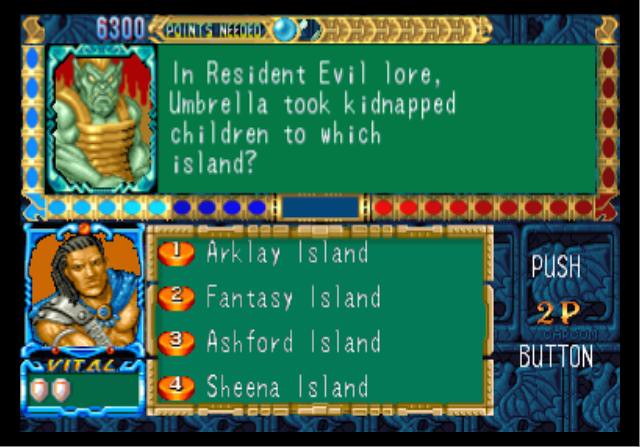
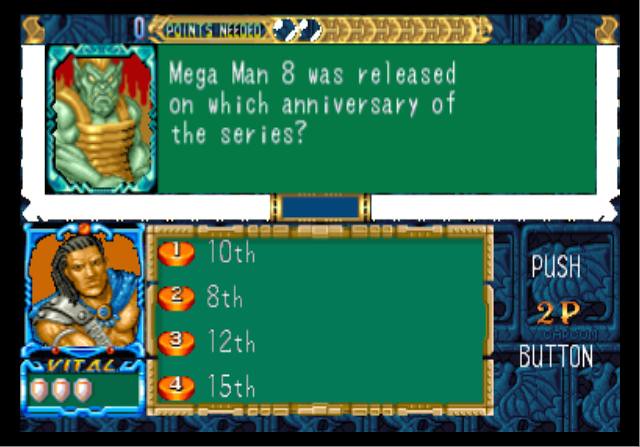
Perhaps the most interesting thing about Quiz & Dragons — besides it being the only game of its sort in English — is that there’s an official ROMhack of it on Capcom Classics Collection 2. It’s a bonus feature called “Capcom Quiz,” and it’s Quiz & Dragons with all of the questions replaced with trivia about Capcom games. It’s kind of neat, but it’s still Quiz & Dragons, meaning it feels like a chore once the enemies regularly start getting five or more health. But hey, if you know about boss weaknesses in some of the more obscure Megaman spinoffs, now’s your time to shine!
Quiz and Variety: Sukusuku Inufuku (Video System)
When the Tamagotchi sparked a craze in Japan and abroad, it sparked a lot of interest in virtual pet raising simulations. The concept is extremely versatile: you could focus an entire game around it, it could implemented as a sub-game in bigger titles, or it could serve as the connecting tissue between a bunch of other types of gameplay. Seeing as how Japanese devs had managed to theme quiz games around all manner of concepts and genres, it should come as no surprise that pet raising would be latched onto immediately. The appeal is tremendous: once players put their coin in and see the cute little critter they raise by answering a bunch of trivia, they immediately have a bond that compels them to keep funneling coins in no matter how many questions they get wrong.
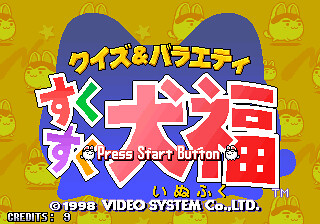 Perhaps the most exemplary pet-raising themed quiz game is Video System’s Sukusuku Inufuku (Quickly-growing Inufuku), a game about raising a strange new pet that is kind-of sort-of like a dog, but also a bit of rabbit and cat and basically every other fuzzy critter humans find adorable.
Perhaps the most exemplary pet-raising themed quiz game is Video System’s Sukusuku Inufuku (Quickly-growing Inufuku), a game about raising a strange new pet that is kind-of sort-of like a dog, but also a bit of rabbit and cat and basically every other fuzzy critter humans find adorable.
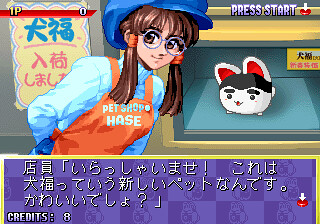
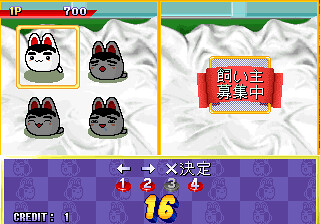
You begin the game by walking into a pet shop and meeting a nice young clerk who persuades you to take home a brand new pet called an Inufuku. It’s a blobby little white critter with big ears and seemingly no legs, but don’t worry, she assures you your pet will grow quickly… that is, if you’re skilled at trivia. (From the get-go, it’s clear that the game will be filled with the kind of oddball humor that seeps into a lot of Video System’s works: You can actually say “no” when the clerk asks you to take an Inufuku home, only to get a fake Game Over screen.) From that point on, you are now a proud Inufuku owner.
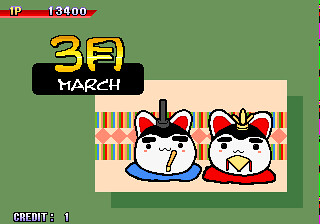
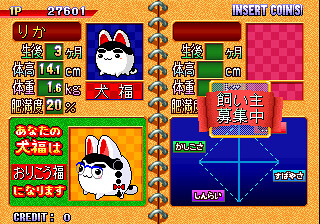
The influence of Tamagotchi on the Inufuku is undeniable: these strange little critters don’t really look like dogs (“inu” in Japanese), but they’re designed to have a sweet, appealing weirdness that makes them weirdly lovable. (Japanese speakers may have already caught onto a pun: the snack daifuku 「大福」is one kanji brushstroke away from Inufuku 「犬福」, hence these critters’ rotund, blobby appearance.) Your choices throughout the game, as well as your performance in the various trivia sections and mini-games, determine how your Inufuku grows, allowing them to take many forms over the course of the in-game year.
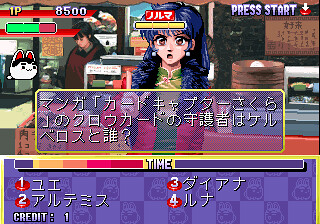
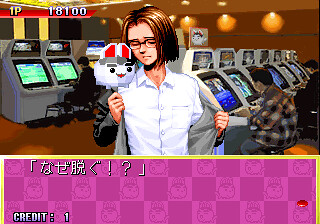
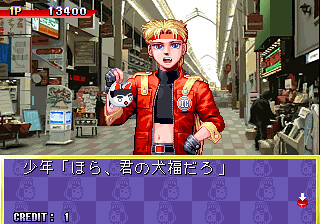
Some of the non-quiz choices you make throughout the game involve taking your pet to different locations, which is where you meet Sukusuku Inufuku’s eclectic cast of supporting characters. In Jojo’s Bizarre Adventure, it’s said that Stand users attract each other somehow, and the same seems to go for Inufuku owners: suddenly, everyplace you go is inhabited by someone else who has a squishy-dog-thing, and wants to compare their pet to yours through quizzes and mini-games. Sometimes they’re friendly, sometimes they’re rivals, sometimes they’re downright weird — like the fellow inhabiting the arcade who thinks losing a challenge means he has to remove his clothes (a weird reference to softcore mahjong games). Every encounter with a new (or old) face is interesting and memorable… and you might even see a few familiar characters if you’ve spent time in other parts of the Video System game universe!
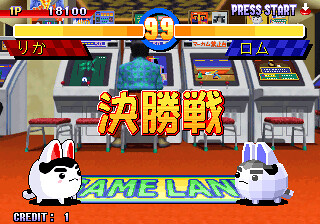
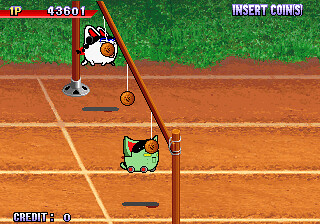
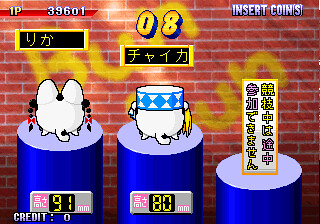
Oh yeah, mini-games! I mentioned these already, but there are several simple mini-games that usually occur when you encounter another character. These are less dependent on Japanese/trivia knowledge and more about good ol’ button-pressing skill. There’s even a four-button fighter (no joystick, mind you) that has tech. Simple tech, but nonetheless effective strategies. That’s pretty impressive!
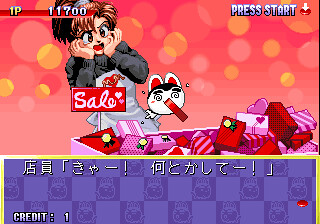
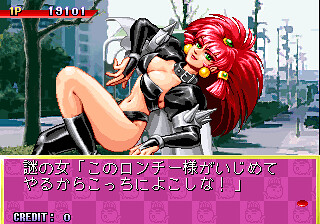
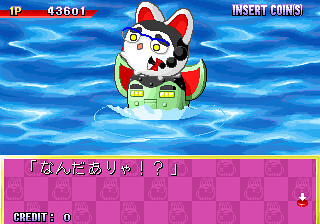
If it’s not clear already, I really, really like Sukusuku Inufuku. The pet-raising concept is a fun one that holds your interest, the designs of the Inufuku are heckin’ adorable, the humorous characters and fun situations are enjoyable to engage with, and the quality of the graphics and music are stellar. It’s a delightful little game that deserves to be played and enjoyed. Even though it’s hard for most players outside of Japan (myself included) to really get 100% out of the game, enough of the appeal should still come through to make it a fun play. It’s also quite ingeniously engineered in a way to inspire multiple playthroughs with different outcomes, so get out there and raise a whole lot of Inufuku!
(It should be noted that a sequel was released in 2004, but didn’t seem to see much distribution. I actually haven’t played it yet, though I intend to very soon.)
Kosodate Quiz My Angel (Namco/MOSS)
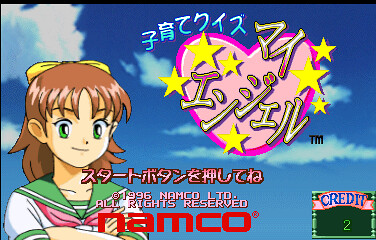
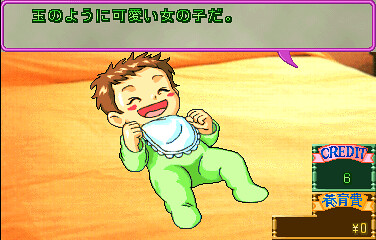
Raising a weird pet-hybrid is one thing, but what about raising a kid? That’s exactly what you do in Kosodate Quiz My Angel (“Child-rearing Quiz My Angel”). At the beginning of the game, you’re given a brand-new bouncing baby girl, and it’s your job to raise her into a well-adjusted adult. Whether or not you actually do that, well…
(Yes, those are crayon drawings of Tekken characters in the background of the attract mode!)
There’s a definite Princess Maker vibe in Quiz My Angel. Much like in Sukusuku Inufuku, the quiz portions are broken up by bits where you have to make choices about raising your child. Depending on the questions you answer correctly and what you do, various parameters relating to personality traits (including “seriousness,” “mischeviousness,” and even “otaku”) will rise and fall, determining your girl’s appearance and what event occur later on.
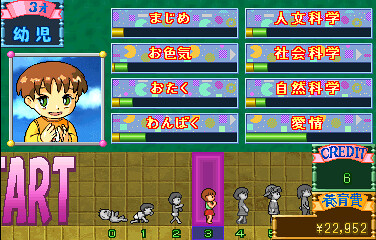
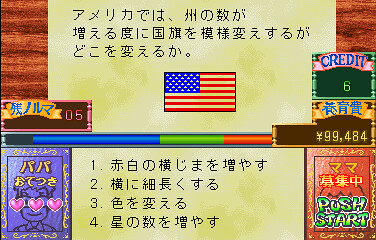
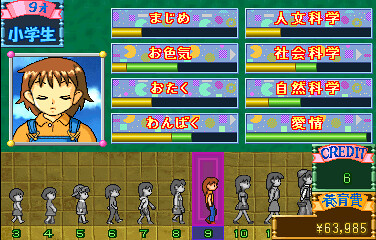
Important life choices, such as deciding what school to enroll your kid in, warrant additional quiz sections. Much like in real life, you’re not getting into the good Japanese schools unless you pass that all-important entrance exam.
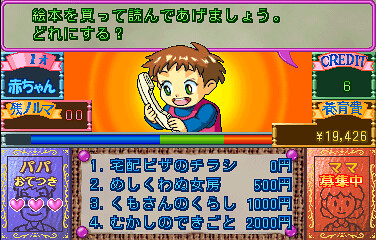
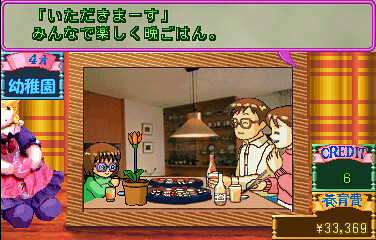
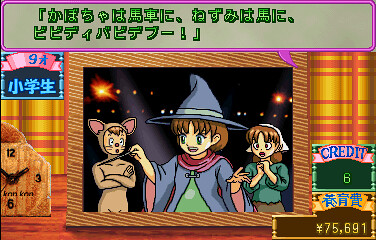
Complicating matters is that you also have a budget to work with: answering questions quickly and correctly will fill your coffers with yen, and many of the choices you make require you to spend some money. Sure, you might be tempted to blow some money on an expensive sushi dinner to celebrate your little lady getting into a good school, but what happens when the next set of questions sucks and leaves you flat broke?
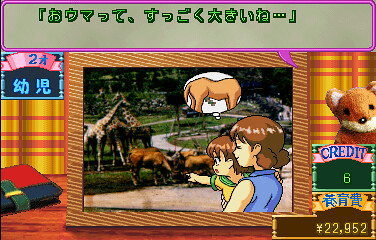
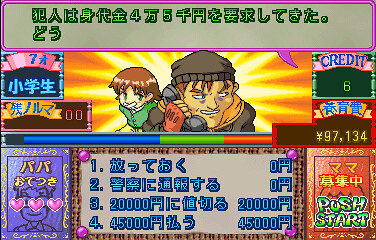
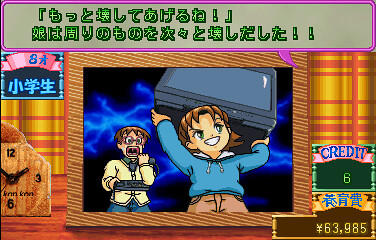
Seeing the story/result screens and the various situations you and your kid wind up in as she grows up is the game’s real draw. It’s not all heartwarming family time, as there’s plenty of references to the awkward elements of parenting as well (such as your excited toddler pointing at the giant horse dong at the zoo). Sometimes things get a little weird and scary, like having your daughter get kidnapped and held for ransom, or your teenage girl having an inappropriate habit of not wearing her underwear around the house. While the beginning is pretty basic, the choices and outcomes become more complex as you progress, and later games in the series offer a fair bit more complexity overall in the parenting portions.
Quiz my Angel was quite a success for Namco: it got a couple of sequels (2 has you raising both a girl and a boy, 3 introduces pets) as well as a port to the PlayStation. It also inspired a couple of spinoff games for various platforms (including one themed around raising a horse for a derby called Derby Quiz: My Dream Horse1), with the last one landing on the DS in 2006. I’m pretty sure that makes Quiz My Angel of the longest-running quiz series out there outside of Quiz Magic Academy
Daisukiss (Konami)
Man, Daisukiss is weird. In a really good way.
Daisukiss is a pun, combining the word “daisuki” (“I love you!”) with “kiss”… which tells you almost everything you need to know. This is a game all about weird horny anime teenagers: you pick one, raise affection with one (or more) of the other teens, and then eventually smooch. It’s pretty great!
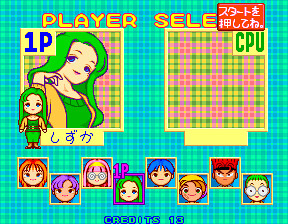
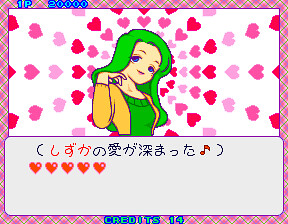
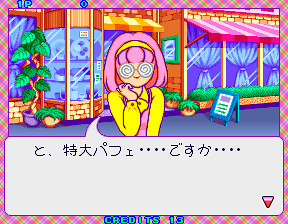
So how do you worm the way into the hearts of these other characters? Quizzes, of course! …but also minigames. Actually, the minigame-to-quiz ratio in Daisukiss is a lot higher than, say, Sukusuku Inufuku: I’d put it at around 50/50.
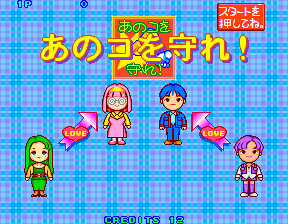
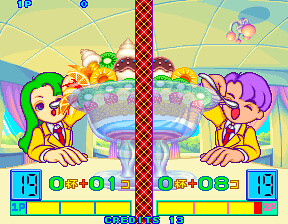
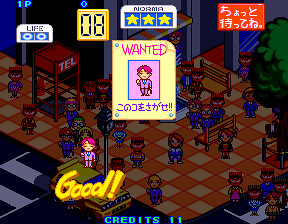
Anyone who has played Konami’s Bishi Bashi series knows that they have a knack for weird, engaging minigames, and the diversions in Daisukiss are similarly enjoyable. Whether it’s trying to scarf a parfait before a rival does, making takoyaki balls, or attempting to wow romantic interests with Simon-Says dance moves, you’ll have a fun time playing the minigames.
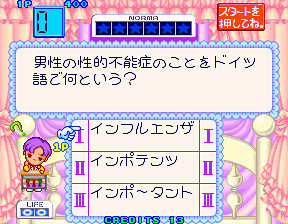
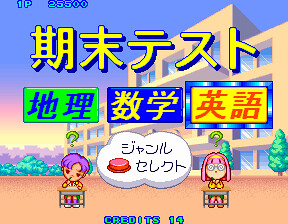
The quiz parts, from my experience, are considerably more accessible to Western folks than in other games of this sort. You’ll have the usual trivia selections, but most of what I’ve seen is less dependent on specific cultural/time period knowledge than other quiz games2. Other quiz portions have you unscrambling English words or figuring out simple math problems, which are easy to do with limited Japanese knowledge.
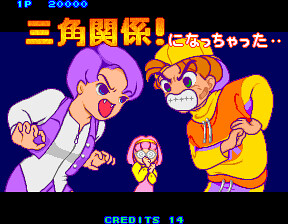
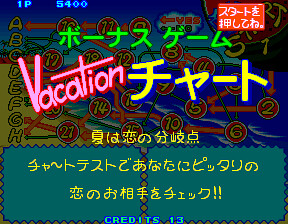
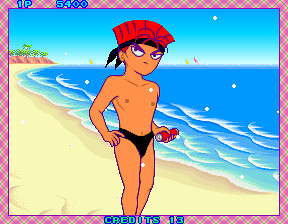
The presentation of Daisukiss is a ton of fun. Characters will react and get into heated battles over romantic interests, while “interlude” sections of the game have you doing things like taking a personality quiz to determine which of the other characters is most like your type. The character designs aren’t terribly detailed, but that’s perfectly fine — they’re plenty charming as-is, and the more minimalist art style makes Daisukiss really stand out.
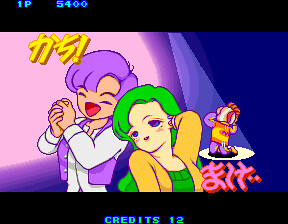
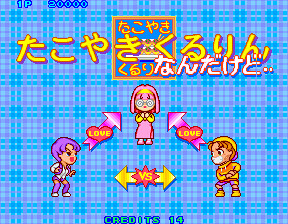
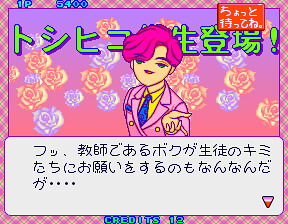
By the way, I should note that yes, same sex relationships are totally a thing in Daisukiss. Konami in 1996 was ahead of the curve somehow, and that’s awesome. Honestly, I think a lot of LGBT folks would have a fantastic time with the gender-be-damned romantic playfulness of Daisukiss, and I’m not-so-secretly hoping that highlighting it will lead it to inspire a few folks to make similar games of their own.
Well, there you have it — a whole lot of words about Japanese quiz games. I hope reading this has given you an insight into the genre. While the barrier to entry for these games is incredibly high, they’re still worth experiencing (yes, even by cheating) to see how you can transform the age-old concept of the trivia game into things that are fresh and engaging. If you do try out any of these games, please let me know what you think! Maybe we can even kickstart the genre’s popularity in the west — we’ve got a ton of Western indie visual novels inspired by Japanese games now, so maybe quiz games can be next? I know, it’s a longshot, but I love seeing variety in gaming experiences out there. Even if the only thing this article accomplished was making you think a little bit more about a type of game you originally dismissed, then my work here is done.
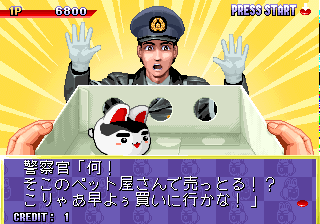
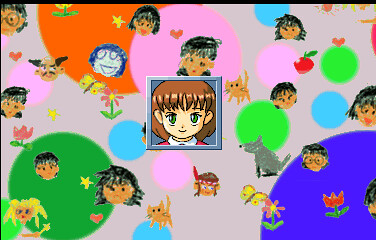
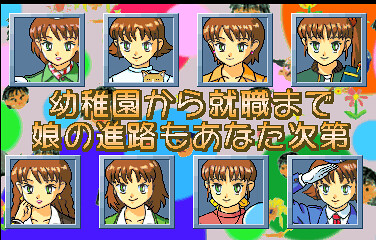
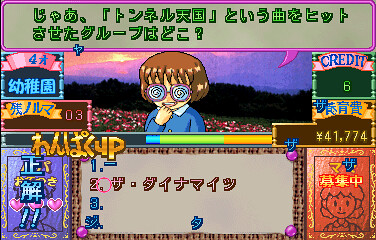

I think it’s also totally worth mentioning that GameCenter CX has covered a variety of quiz games (including Quiz My Angel) over the years, and generally they’ve ended up being some of the more entertaining episodes!
This post got me interested in that Capcom Quiz rom hack of Quiz & Dragons and wondering if I could put it in the real hardware so I dug into the game. Unfortunately it turns out it’s not a real rom hack and the questions are injected into the game via the elf used to launch the emulator. The question and answer format that it injects isn’t the same as the system the game uses so you can’t just throw it into the rom and have it work either.
I did however verify that the actual CPS1 program roms and gpu roms are used by the games and are gzipped inside a larger file. What’s odd though is the emulator doesn’t emulate the sound and instead uses wav files for sound playback. Just an interesting tidbit I thought you might find interesting!
Nice to see someone highlighting DaisuKiss. I discovered that game when I first got MAME and downloaded a bunch of ROMs. I must have selected this one by accident, as I was very confused when I saw it in my menu, and I decided to give it a shot. I enjoyed it enough that I then showed it to my girlfriend, and it became one of those games we played when we got together for a while. It was that and Super Baseball 2020. Good times.
Small warning for those who don’t know Japanese who want to try it: when you have the option of selecting between three quizzes, never chose green. It’s a quiz where you have to match a capitol to its prefecture, meaning each question has 50 options, so it’s not something you can easily just mash a and continue through.